Mor Naaman, a research scientist with Yahoo Research Berkeley, stood in front of a roomful of semantic Web researchers and declared that the semantic Web is dead. This happened last week at the International World Wide Web Conference in Alberta, Canada, as Naaman describes on the Yahoo Research Berkeley blog. [Search Engine Watch]
The language used to describe the Semantic Web is complicated enough – at a glance, it looks a bit quantum theory-ish, just enough to make your eyes roll back into your head to look for ways to kill themselves – but Tim Berners-Lee, who's responsible for all those Ws littering your URLs, inspired enough faith that whatever the Semantic Web was, it could be accomplished. [Arguing The Semantic Web: Dead Or Just Not Alive?]
May 16, 2007 on 10:24 am | by Mor Naaman, a research scientist @
Yahoo! Research Berkeley:Last week, I participated in a WWW2007 panel called “Multimedia Metadata Standards in a Semantic Web 3.0“, where I took the opportunity to declare the Semantic Web dead. As you can imagine, such a declaration in front of a crowd of semantic web researchers provoked many responses. While I believe panels should be provocative and entertaining, I also have specific reasons for why I went as far as calling the Semantic Web “dead”. Let me explain what I mean.
There is no way that we can engage the masses in annotating media with “semantic” labels. At best, we can get the people to annotate content (such as Flickr images or YouTube videos) with short text descriptions or tags. This works only because tags are simple; powerful (can be used for many tasks) and, in some systems, carefully engineered to match the user’s natural motivations. Our best hope is to be able to take this bottoms-up annotation, or folksonomy if you will, and try to assign some semantics to it later - Flickr’s Clustering is a great example, as well as Y!RB’s TagMaps and our upcoming SIGIR paper (”Towards Automatic Extraction of Event and Place Semantics from Flickr Tags”, available in pdf)...
continue readingSee also my related posts:
WEB IS A FOREST ... SEMANTIC WEB A JAPANESE GARDEN ?
Seamless Structured Semantic Web -Will Tags, Clouds, Ontologies, Taxonomies, and Facet Analysis help?
Semantic Web and Facet AnalysisLabels: Best Practices, Infostructure, Internet, Reading, Web, Web sight
"Just an observation of interest to librarians, about Web 2.0 types of websites.





